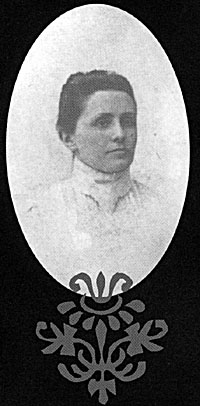
This portrait of Jewish feminist Puah Rakovsky is is from her newly translated memoir. |
The following is a list of books published recently by members of the Yale community. Descriptions are based on material provided by the publishers.
To submit information about books for this column, send e-mail to opa@yale.edu.
In "My Life as a Radical Jewish Woman," Puah Rakovsky (18651955) pens her experiences as a Jewish woman in late 19th- and early 20th-century Poland. A professional educator, Zionist activist
This guide for website designers provides practical, concise advice on creating well-designed and effective websites and pages. Focusing on the interface and graphic design principles that underlie the best website design, this book offers help on a full range of issues, from planning and organizing goals to design strategies for a site to the elements of individual page design.
Focusing on the role of gender in representations of youth in post-World War II France, Susan Weiner traces how, after 1945, young men and women came to symbolize different aspects of social order and disorder in a country traumatized by the Nazi occupation and Cold War paranoia, seduced by consumerism and Americanization, and engaged in an undeclared war in Algeria. While political discourses about "youth" generally referred to middle-class young men, Weiner argues that it was in media representations of "bad girls" that anxieties over the loss of a morally and socially coherent national identity found their expression.
T H I S
Bulletin Home
My Life as a Radical Jewish Woman: Memoirs of a Zionist Feminist in Poland
Puah Rakovsky; edited by Paula E. Hyman, the Lucy G. Moses Professor of Modern Jewish History; translated by Barbara Harshav, Lecturer in Comparative Literature, with Paula E. Hyman
(Indiana University Press, 2002)
and feminist leader, Rakovsky broke with her traditional upbringing to pursue equality of life for Jewish women in her homeland. This pursuit led Rakovsky through a constantly evolving social and political climate. Written in Yiddish and translated here for the first time, Rakovsky's memoirs not only reveal her fortitude but also offer insights into a variety of radical political movements, the birth of Zionism and the devastation of World War I.
Web Style Guide: Basic Design Principles for Creating Web Sites, Second Edition
Patrick J. Lynch, Director of Information Technology Services-Medicine Web Design and Development, and Sarah Horton
(Yale University Press, paperback, 2001)
Enfants Terribles: Youth and Femininity in the Mass Media in France, 19451968
Susan Weiner, Associate Professor of French
(The Johns Hopkins University Press, 2001)
 W E E K ' S
W E E K ' S S T O R I E S
S T O R I E S![]()
 Yale PREP to boost number of minorities in biomedicine
Yale PREP to boost number of minorities in biomedicine
![]()
![]()
 Study ranks Finland as No. 1 in environmental sustainability
Study ranks Finland as No. 1 in environmental sustainability![]()
![]()
 Yale Engineering to mark its 150th anniversary
Yale Engineering to mark its 150th anniversary
![]()
![]()
 Yale Opera to present Mozart's fantastical tale 'The Magic Flute'
Yale Opera to present Mozart's fantastical tale 'The Magic Flute'![]()
![]()
 Yale and New Haven: Downtown News
Yale and New Haven: Downtown News![]()
![]()
 ENDOWED PROFESSORSHIPS
ENDOWED PROFESSORSHIPS Paul Freedman is named the Chester D. Tripp Professor
Paul Freedman is named the Chester D. Tripp Professor
![]()
 John Matthews is appointed the John M. Schiff Professor
John Matthews is appointed the John M. Schiff Professor
![]()
![]()
 IN FOCUS: Collection of Musical Instruments
IN FOCUS: Collection of Musical Instruments
![]()
![]()
 Book's authors share perspectives on Sept. 11 and its aftermath
Book's authors share perspectives on Sept. 11 and its aftermath
![]()
![]()
 Three exhibits opening Feb. 11 at the School of Architecture
Three exhibits opening Feb. 11 at the School of Architecture
![]()
![]()
 MEDICAL SCHOOL NEWS
MEDICAL SCHOOL NEWS Nine faculty members honored for their surgical skills
Nine faculty members honored for their surgical skills
![]()
 New Jersey school adopts 'Discovery Room' program . . .
New Jersey school adopts 'Discovery Room' program . . .
![]()
 Peptide linked to narcolepsy may offer key to controlling pain
Peptide linked to narcolepsy may offer key to controlling pain
![]()
 Study underscores complex nature of schizophrenia
Study underscores complex nature of schizophrenia
![]()
 Study: When mental health clinics offer medical care, patients benefit
Study: When mental health clinics offer medical care, patients benefit
![]()
 Findings show acupuncture alone not effective in treating addiction
Findings show acupuncture alone not effective in treating addiction
![]()
 Scientists find similar risk factors for early, advanced breast cancer
Scientists find similar risk factors for early, advanced breast cancer
![]()
![]()
 Noted science reporter to visit as Poynter Fellow
Noted science reporter to visit as Poynter Fellow
![]()
![]()
 Kenyan environmentalist to teach as McCluskey Fellow
Kenyan environmentalist to teach as McCluskey Fellow
![]()
![]()
 'Injustice' of lead poisoning to be explored in F&ES talk
'Injustice' of lead poisoning to be explored in F&ES talk
![]()
![]()
 Event to explore innovative approaches to the law
Event to explore innovative approaches to the law
![]()
![]()
 Eugene Davidson, former editor at Yale Press, dies
Eugene Davidson, former editor at Yale Press, dies
![]()
![]()
 Memorial service for Louis Martz
Memorial service for Louis Martz
![]()
![]()
 Yale Dining Halls has been honored by industry magazine
Yale Dining Halls has been honored by industry magazine
![]()
![]()
 Yale Books in Brief
Yale Books in Brief
![]()
![]()
 Campus Notes
Campus Notes
![]()
 |
| Visiting on Campus
Visiting on Campus |
| Calendar of Events
Calendar of Events |
| In the News
In the News |
| Bulletin Board
Bulletin Board![]()
Yale Scoreboard |
| Classified Ads
Classified Ads |
| Search Archives
Search Archives |
| Deadlines
Deadlines![]()
Bulletin Staff |
| Public Affairs Home
Public Affairs Home |
| News Releases
News Releases |
| E-Mail Us
E-Mail Us |
| Yale Home Page
Yale Home Page